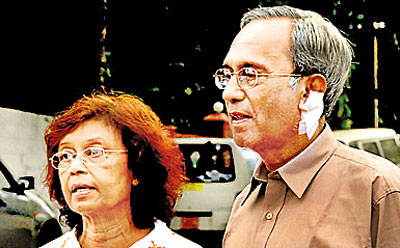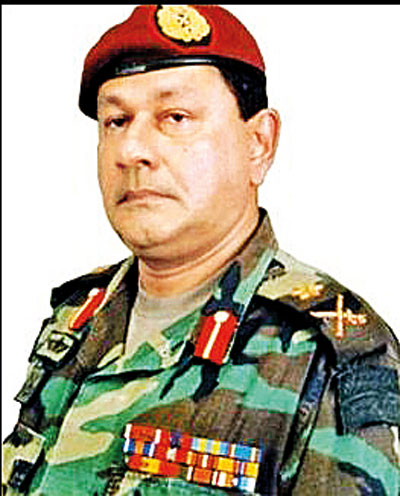Sunday Times 2
Politics of violence, in the lead-up to the deadly Anuradhapura blast
View(s):Remembering Major General Janaka Perera, his wife, Dr Johnpulle, and his wife, a doctor, who were killed along with 27 others on October 6, 2008
By Upul Jayasuriya PC
General Janaka Perera was a war hero. Among his commendations were the gallantry awards, Rana Wickrama Padakkama and Rana Sura Padakkama, distinguished service medals, the Vishista Seva Vibhushanaya, long service medals, Uttama Seva Padakkama, Sri Lanka Armed Services Long Service Medal, foreign service medal, Videsha Seva Padakkama, combat service medals Purna Bhumi Padakkama, North and East Operations Medal, the campaign medals, Vadamarachchi Operation Medal and the Riviresa Campaign Services Medal and the Republic of Sri Lanka Armed Services and the President’s Inauguration Medal.

Dr. Raja Johnpulle and wife
Although he was appointed Chief of Staff of the Sri Lanka Army, he was subsequently bypassed for promotion to Army Commander, the same year, prompting his resignation in 2001. The Welioya battle, where more than 450 LTTE cadres were killed, was considered his greatest feat on the battlefield. However, despite all the bravery, the Chandrika Bandaranaike regime did not trust him to command the Army.
Nevertheless, his subsequent gallantry led to his diplomatic and political careers. He was one of the most decorated soldiers. He was clearly a target of the LTTE.
I do not remember him due to his military prowess. Above all, he was highly respected for his honesty and integrity—an officer and gentleman to the core.
After his stint as an ambassador, he decided to enter the field of politics from the UNP, invited by its Leader Ranil Wickremesinghe, who was the then Leader of the Opposition. Up until then, he was provided with military security. Soon after his entry into the political arena was announced, his security detail was withdrawn abruptly. That was his death knell by the then powers that be. The president at the time was Mahinda Rajapaksa.
He approached me to file a fundamental rights application seeking protection. We went before Chief Justice Sarath Silva. After much persuasion, some security was provided though it was still inadequate. Security was provided only until the provincial council election where he was contesting from the UNP, seeking the hot seat of Chief Minister of the NCP.
During the run-up to the election, his opponents unleashed waves of thuggery and intimidation. On one occasion, the then Chief Minister led a procession to the house of the NCP UNP coordinator, Dr Raja Johnpulle.

Maj. Gen. Janaka Perera
Dr Johnpulle was a much loved and respected personality who had won the hearts of all in Anuradhapura. He had served a stint as Sri Lanka’s Ambassador to Russia. His wife, too, was a doctor. They were not money minded. Many patients were treated free of charge.
In September 2008, a procession led by leading politicians and a member of the Pradeshiya Sabhawa, with more than fifty others, committed arson and set fire to the Johnpulle residence and the dispensary. It was well known that the central political authority of Anuradhapura was present with the mob and had signalled and encouraged the mob. A large group of senior Police officers was present. They merely looked on passively. It was yet another miserable and pathetic display of Police inaction. The crowd that entered the charred house started looting what was left of the belongings.
The Ven. Valawahangunawewe Dhammarathana Thera is the chief priest of the Mihintale Rajamahaviharaya. The monk who had refused to testify in front of the local police, gave evidence in the chambers of Anuradhapura Magistrate Ruchira Weliwatta. He testified that Chief Minister Berty Premalal Dissanayake led their supporters in a procession that destroyed the property of Dr. Johnpulle.
I filed papers in the Supreme Court with my Juniors Sandamal Rajapaksha, Kelum Kumarasinghe and Madhubhashana Ariyadasa under articles 12(1) and 14(1) against the IGP and others responsible for failing to protect Dr Johnpulle’s property. Chief Minister Berty Premalal Dissanayake was also made a respondent. The conduct of DIG Pathirana, in charge of the North-Central Province, featured prominently. This was on August 19. Janaka Perera lost the PC elections held on August 23. It was a pyrrhic victory for Berty Premalal due to the high degree of violence perpetrated on the day of the elections before and after. All the newspapers papers reported this heinous crime.
Soon after the burning down of the properties of Dr. Johnpulle, his wife and I visited Anuradhapura with a few of my juniors and saw the ransacked house in ashes. The house was situated alongside a public road, almost 150 meters from the High Court premises. We visited DIG Pathirana in his office and complained about Police inaction.
A few days later, I returned home. I drafted papers to be filed in the Supreme Court on behalf of Dr Johnpulle about Police inaction. On the 2nd evening, Dr. Johnpulle and his wife visited me. They were seated on the verandah of our house. My wife Chula carried in a tray of refreshments. Dr. Mrs. Johnpulle spoke to her husband, Raja, in a trembling voice. She said, “Look darling, how much you helped those people in Anuradhapura! See what happened today; we are on the road! We have nothing left”. Dr. Johnpulle was heard trying to console her, saying, “Don’t you worry darling. We have us! We shall stand up again. Together we can do it.” This conversation was heartbreaking for anyone. My wife was full of tears. It brings tears even today.
We discussed the case to be supported in court on the 2nd, which was a Thursday. That was the first time I had ever met Dr. Raja Johnpulle. During the brief discussion, he insisted that I come to Anuradhapura on the following Monday, the 6th, and appear in his case before the Magistrate. I didn’t give him a word. We agreed to meet around the petrol shed near Orion City as Dr. Johnpulle and his wife wanted to be accompanied by me. I agreed. We entered the Supreme Court together. Many had come to court No 502 to watch the proceedings. Amongst them were General Janaka Perera and his wife, Mr. Karu Jayasuriya, and many UNP Parliamentarians.
The bench was presided over by Justice Raja Fernando. He was an honourable man. The state counsel was instructed to object to the grant of leave to proceed. It was pathetic. After the lengthy submissions, the bench nevertheless granted leave to proceed. At the end of the day’s proceedings in court, Dr. Johnpulle held my hands, thanked me profusely, made a final appeal, and urged me to come to Anuradhapura on Monday the 6th. He passingly commented that Janaka Perera was opening his office on Monday, and thus I could attend the function as well. I nodded and finally agreed to go to Anuradhapura on Monday.
In the meantime, Major-General Janaka Perera reiterated his request to me to file a second application in the Supreme Court seeking security, as the protection that was provided as a sequel to the earlier fundamental rights application that I filed on his behalf had been withdrawn after the election. He would normally have been given protection after retirement as he was a top target of the LTTE. However, he had to pay a price for having contested on the UNP ticket against the ruling party.
Whilst I was planning to go to Anuradhapura on Monday the 6th, Joseph Stalin, a trade union leader who had organised a strike at the Colombo port, dashed into my chambers with his colleagues on Saturday the 4th. He was disturbed as Chief Justice Sarath Silva had summoned all the trade union leaders to court in a fundamental rights application that had been filed by some exporters. They were apprehensive that they would be remanded if they didn’t comply with his orders to abandon the strike. I explained my difficulty as I had already promised Dr. Johnpulle that I would come to Anuradhapura to appear in his case. When I weighed the circumstances, I believed I had to oblige Joseph Stalin as they were in greater danger of being remanded. It wouldn’t have stopped with that as they knew the fate that befell Tony Emmanuel Fernando, who was remanded for arguing with the judges in open court, and was later brutally assaulted in remand prison.
I decided to stay on. I didn’t go to Anuradhapura. Instead, I worked on the draft petition of Major-General Janaka Perera on Monday morning sent to me by my junior in the case, Shivan Coorey. I finalised the draft and emailed the same to Shivan at around 8.40 am on Monday. Approximately 10 minutes later, Shivan called me with the dreadful news. He informed me that a powerful bomb had been blasted in Anuradhapura at the new office of Major-General Janaka Perera.
I was speechless. As minutes and hours passed, it became known that nearly thirty people had died, with more than ninety people severely maimed or injured. Janaka, his wife, Dr Johnpulle, his wife, lawyer Hameed and his wife Chandani, and many others were brutally killed. Sadly, there was no security provided for the meeting. There was a well-known sinister hand moving behind. That was no coincidence. Many theories were propounded. Many believed that there was a government hand in it. Who cared? Lives were lost. The government didn’t care at all.
I had to do something…whatever was within my reach. With some difficulty, I contacted the relatives of the dead and injured. It was a Herculean task. My juniors assisted me in obtaining affidavits from some of the injured. Some were individual affidavits. Some were joint affidavits. This matter came up before the Supreme Court for several days. Sadly, leave to proceed was refused by a bench presided by Dr. Shirani Bandaranayake due to some defect in the affidavits! We had no other place to turn to. We had to leave it in the hands of God …! It appeared that the country’s apex court has become an academy of law! This is something that many jurists and many judges have rejected.
As of today, a decade and a half later this heinous incident that was perpetrated partly by those in the higher echelons of the country, the matter has been swept under the carpet. Those who were mercilessly killed and others — more than 90 who suffered life-threatening injuries — are still undergoing various infirmities and hardships, unable to go on with their livelihood. They have no one to turn to.
Those politicians whose houses were burnt during the ‘Aragalaya’ are being paid compensation. Those like Lasantha Wickramatunga, Prageeth Ekneligoda, Sivaram, Raviraj, the 11 youths killed in Trincomalee, and the five youths abducted from Colombo and killed are the unfortunate victims of all this violence and fading away from the memories of the powers that be. But they shall not be forgotten by all.

